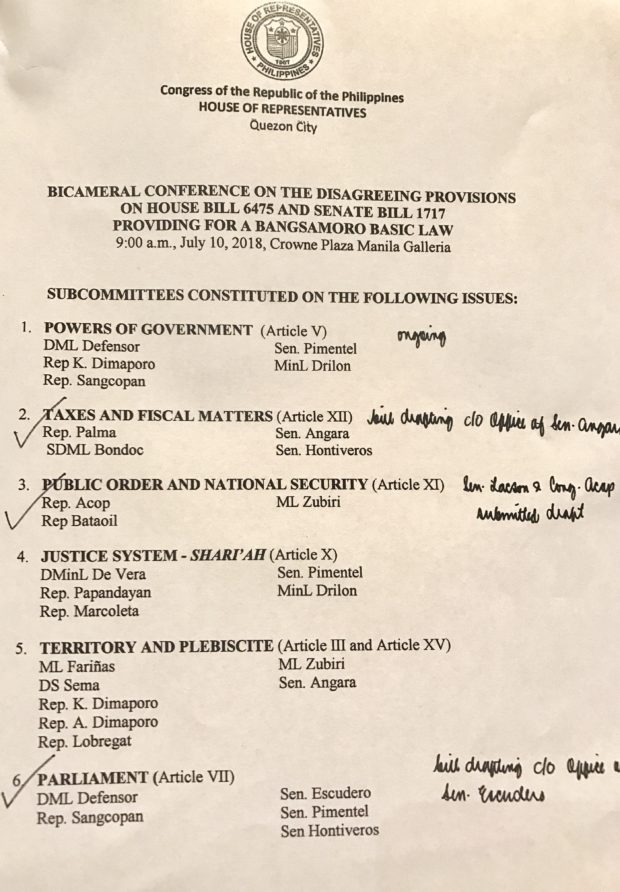Three of the remaining six most contentious provisions of the Bangsamoro Basic Law (BBL) have been agreed upon by the bicameral conference panel, its chair Senate Majority Leader Juan Miguel “Migz” Zubiri bared on Tuesday afternoon.
In a media briefing five hours into the panel’s deliberations on House Bill 6475 and Senate Bill 1717, Zubiri said the subcommittees had already finished tackling the provisions on taxes and fiscal matters (Article XII); public order and national security (XI); and the parliament (Article VII).
The provision on the powers of the government (Article V) is currently being deliberated by the subcommittee headed by Senate Minority Leader Franklin Drilon and Senator Aquilino Pimentel III. Drilon is also set to lead the discussion on the provision on justice system (Article X) this afternoon.
Meanwhile, Zubiri said the panel decided “to put on hold” until Wednesday the deliberations on the provision on territory and plebiscite (Articles III and XV) due to its controversial nature.
“Medyo mainit at napakatindi ng discussions na nangyari ‘run, so we said let’s put this on hold until the last part. We’re looking at tomorrow [Wednesday] to resolve this and hopefully by tomorrow evening we’ll have a clean copy of the bicam committee report,” the senator told reporters.

Territory and plebiscite
Zubiri said the contention stems from the Moros’ preference for the “opt-in” proposal in the Senate version of the BBL, that would allow 39 barangays in North Cotabato and six towns in Lanao del Norte to join the envisioned Bangsamoro region following a plebiscite.
The House version of the BBL has a similar provision wherein local government units (LGUs) may only join the Bangsamoro if their mother province or town also votes in favor of inclusion.
READ: Moro leaders prefer opt-in provision in Senate version of BBL
“So far, and nagre-raise ng protests dito ay ‘yung district representatives of the six municipalities,” Zubiri pointed out.
“The fundamental difference of the two versions is the House version it has to be majority vote of the province. In the Senate version, that is not necessary, it is just the majority vote of the municipality,” he explained.
Some proponents of the version of the Bangsamoro Transition Commission (BTC) have argued that the House version would make their chances of being part of the Bangsamoro slimmer.
“Wala kasi silang chance manalo kung ang mother province ang madedesisyon and dalawang beses na raw sila nanalo sa dating plebisito pero dahil mother province nagdedecide, hindi sila nakakasama (sa Bangsamoro),” Zubiri said.
Although the senator from Mindanao wanted the panel to achieve a win-win solution on the issue, he admitted that this would be difficult to achieve.
“Merong uuwing luhaan on this issue. It’s just managing the outcome,” he lamented.
Bangsamoro regional police
Uniformed services in the Bangsamoro would still be under the direct command of the Philippine National Police, according to Zubiri.
“It is a no-compromise issue… it was also ordered by the President,” he said.
The Bangsamoro regional police, he added, would be headed by a regional director, who shall upon consultation with the chief minister, be appointed in accordance with Republic Act 6975 or the Department of the Interior and Local Government Act of 1990.
READ: Civic groups: We need BBL that recognizes people’s rights, freedom
Taxing powers
Zubiri said the panel agreed to adopt the Senate version when it comes to the taxing powers of the Bangsamoro government.
Article XII, Section 9 of SB 1717 states that capital gains, documentary stamp, donors and estate taxes in the Bangsamoro may be levied by the Bangsamoro government.
“Exclusive kasi ‘yan ng national government. We allowed the Bangsamoro to collect these,” Zubiri said.
Parliament
The senator said the panel also agreed to retain the parliamentary form of government for the Bangsamoro.
There will be a Wali who will serve as the ceremonial head of the Bangsamoro government, he added.
The Bangsamoro Parliament will issue a resolution reflecting its consensus on the selection of the Wali from a list of names of eminent residents of the Bangsamoro submitted by the Council of Leaders.With a report from Syrah Vivien Inocencio / INQUIRER.net /jpv